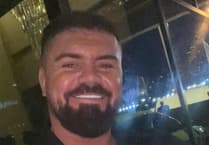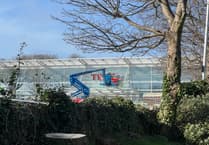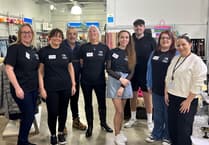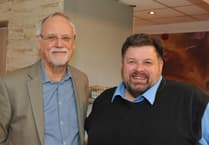It may look like a peaceful, even enviable rural scene – cows and sheep grazing in the fields on a beautiful spring day.
What could be simpler than the life of a farmer?
The reality is somewhat different. ‘Gone are the days when people used to think of farmers sitting on a hedge chewing a bit of straw,’ says Vicky Sloane Masson.
Twelve years ago, she and her husband Neil started a dairy enterprise on their family farm in Ronague. They work 12-hour days in what a well run and considered venture with carefully planned investments and a high emphasis on animal welfare. But huge rises in their input costs – animal feed, fertiliser, and energy – coupled with the fact that they can only sell their product to one source, and for a fixed price, have brought unprecedented pressures. So how do they make it pay?
Vicky says: ‘I think if you were an out and out business person, and it was an ordinary business, and you didn’t have the whole passion and your family all around you and things like that – I don’t think you would get as many people into farming.
‘On the other hand you really do have to have a business head on too because if we don’t make money we can’t afford to feed our 90 cows.’
The writing has been on the wall since last year when Russia’s invasion of Ukraine sent animal feed and fertiliser prices spiralling upwards, and, in some cases, tripling. Their initial reaction, Vicky says, was panic.
She goes on: ‘Then we sat down and came up with a different way we can run the business for that year and we looked at the different things we could try and save.’
They decided they couldn’t cut the amount of animal feed they were purchasing but what they could do was to make their methods of feeding as targeted and efficient as possible and by doing so, increase the number of litres their cows produce.
‘It’s always been in the back of our minds. We’ve benchmarked since the day we started the dairy enterprise and it’s really been helpful to keep an eye on costs. We actually benchmark our purchased feed every month, that’s one of the highest costs for a dairy enterprise.
‘It’s the old saying. You can’t manage it if you can’t measure it.’
And that is exactly what she and Neil do. They measure literally everything.
Even the grass is measured, with a plate meter.
This allows them to fence off the right amount for 90 cows to graze without wastage before moving on. And it’s good for the environment too because this method encourages the grass to grow quicker, and growing grass is a top performer when it comes to capturing carbon.
No one can look into the future, no matter how carefully they plan, but Vicky and Neil made two significant investments before anyone had any idea of the cost issues that were on the way. Both of them have proved justified, as they have boosted the farm’s efficiency and helped to save money.
‘The first was a new mixer wagon which mixes the high protein crops they are growing, like clover and lucerne, so that every mouthful has consistent amounts of nutrients.
Vicky says: ‘This was the first winter we’ve had it and the cows have performed a lot better and we’ve ended up with more milk than we thought, so it has paid off in that way.’
The second item they bought was a computerised cow monitoring system. Each cow wears a collar which monitors her rumination and eating patterns which are used as indications of each cow’s health. It sends regular updates to Vicky’s mobile phone and also alerts if the cow strays from her usual pattern, to Vicky’s mobile phone.
It also tells Vicky when is the optimum time for the cow to get pregnant.
The way it works in a dairy business is that cows must be put in calf every year in order to continue producing milk. However, whilst there is a need to breed replacement cows to keep the numbers up in the herd, any more than that, and any bull calves, are surplus to requirements.
Accordingly Vicky and Neil have a carefully-planned and managed breeding programme.
They use sexed semen to breed female replacements for the cows with the best bloodlines and which have given the best milk yield in terms of protein and butterfat, over the years. So good is their breeding programme that one of their cows won the Supreme Champion title at the Royal Manx Show in 2021.
They used to breed a few extra of these each year, to sell to other farmers but this year they have cut back on this due to the extra feed costs and uncertainty in the markets when they come to sell them. This year they will just breed their own replacement cows; for the others in the herd, they will use semen from beef breeds and these calves are sold on, usually at around a fortnight old, to farmers who will grow them on to adulthood to produce meat.
‘That was another little adjustment we made and it helps with cashflow because obviously you had to keep feeding those other extra animals,’ says Vicky.
Dairy cows are generally made pregnant through the use of AI – in this case, that’s artificial insemination, not artificial intelligence – and Vicky does this herself. It’s just another example of the range of skills farmers have to have.
Vicky says: ‘Neil is good at looking after all the machinery - he does fixing and maintenance - and I do the cows.’
Vicky says: ‘What does concern me is that we’ve always got in the back of our minds that we need to reduce input costs and, when the milk price starts to drop, there isn’t any investment getting done, as in buildings and things like that.
‘I worry about what we’re leaving for the next generation because we are only here to look after the bit of land that we’re looking after in our lifetime aren’t we? It’s still going to be here after we’re gone and someone else is going to pick it up and carry on.
‘I think it’s the investment in the farms that probably worries a lot of people as there’s just no money to do that right now.
‘We’d love to invest in solar panels and win power but they are still very expensive and, if we needed a new shed, where’s that money actually going to come from? We’ve also got to think about retirement as well, and where that money for that is going to come from.’
But the most important thing to bear in mind for Vicky when she is looking at balancing the books is an element most businesses don’t have to factor in: the welfare of their animals.
She says: ‘When you’re talking about cutting costs, the one thing that we would never do is compromise the cows because it’s just false economy.
‘In my mind they need what they need and there’s no getting away from that, so that’s also important.’




